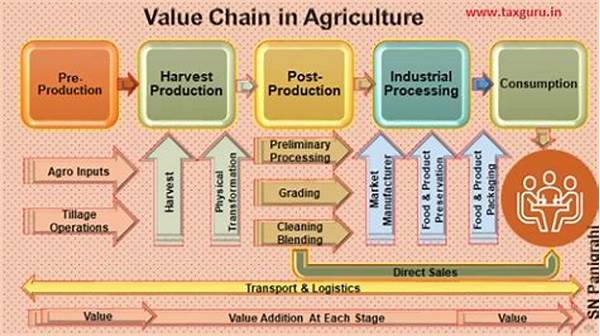Small farms are the backbone of many agricultural economies, providing fresh produce, dairy, and meat products to local markets. However, these farms often face significant challenges, including limited access to markets and resources, and logistical hurdles. Strengthening small farm supply chains is crucial for enhancing their viability and sustainability. This expository article will explore strategies to achieve this goal, incorporating insights and solutions to empower small farmers and ensure the vitality of their operations.
Read Now : Elegant Italian Culinary Urban Retreat
Breaking Down Barriers in Small Farm Supply Chains
Strengthening small farm supply chains is like tuning up a classic car—it’s a blend of nostalgia and innovation, ensuring smooth runs and fewer breakdowns. Small farms often cruise on the edge, facing potholes like limited access to big-time markets and antiquated distribution systems. You know, the kind of stuff that makes you wanna throw your hands up and holler. Strengthening these supply chains means paving the roads with tools and tech that can turn a sketchy ride into a joyride. We’re talking tech innovations, more direct-to-consumer sales, and community-supported agriculture (CSA) programs that act like GPS for navigating the twists and turns of the agriculture business.
But hey, it’s not just about the tech, bro. It’s also about forming solid crews and partnerships. Whether it’s linking up with local grocers or collaborating with other small farms to share resources, the community vibe is essential. The goal is to make sure these farms aren’t just surviving but thriving. We’re all in this together, after all. So, strengthening small farm supply chains is like creating the ultimate playlist—it’s gotta be varied, reliable, and just plain good, man. These strategies help ensure small farms don’t stall out but continue to grow and deliver the fresh, delicious goods we all love.
Five Key Moves to Boost Farm Supply Chains
1. Networking: Get those farmers linking up with local markets, supermarkets, and restaurants. It’s all about who you know, right? Strengthening small farm supply chains is like building a social network that actually feeds you.
2. Tech Savvy: Farms going digital are like magicians with smartphones—whether it’s apps for crop management or digital marketing, they’re turning tricks to stay ahead. Strengthening small farm supply chains with tech is a game-changer.
3. Cooperative Power: Imagine farmers forming alliances, co-ops, and sharing resources. By grouping up, they’re cutting costs and boosting their power game. Strengthening small farm supply chains through collaboration is a win-win.
4. Direct Sales: Farmers need to become marketing wizards, selling straight to consumers. Farmers’ markets, CSAs, and pop-up shops? They’re the new arenas for farm-to-table action. Strengthening small farm supply chains through direct sales amps up the profits.
5. Sustainable Practices: Going green isn’t just trendy—it’s practical. Strengthening small farm supply chains means adopting eco-friendly farming methods that save money and the environment. It’s a blend of Mother Nature and economic sense.
Tech Revolution in Farm Supply Chains
When it comes to strengthening small farm supply chains, technology is the secret sauce that spices up the whole operation. Think about it—drones flying over fields like sci-fi movie stars, capturing images to boost crop management. It’s like farming in high def! Farmers are also embracing apps that track everything from weather patterns to pest threats, turning their phones into farming powerhouses. Talk about leveling up! These digital tools aren’t just cool; they’re essential for making informed decisions and keeping farms running like well-oiled machines.
Then there’s the magic of e-commerce. While shopping from your couch for farm-fresh goodies, don’t forget the farmers on the other end, setting up virtual stalls with the click of a button. By strengthening small farm supply chains through online marketplaces, these farms reach a wider audience, selling their produce faster and fresher. It’s like farmers finally getting a golden ticket to the consumer show, showcasing their goods without leaving the barn. And let’s not forget sustainable tech innovations that cut down resource usage while boosting yield. It’s a digital age, folks, and tech is the tractor driving farms into the future.
Read Now : Downtown Italian Fine Dining Venues
The Role of Community in Supply Chains
Community is the unsung hero when it comes to strengthening small farm supply chains. Picture a bunch of farmers chilling together, sharing tips and trading tools like they’re at a backyard barbecue. This sense of community is golden, allowing small farms to harness collective power. Sharing resources like equipment or workforce can significantly reduce costs. Groups like farm co-ops are popping up everywhere, creating mini-agricultural armies ready to take on the giants. These collaborations aren’t just cost-effective; they’re a lifeline for farmers working alone in the fields.
Moreover, community support extends to consumer relationships. Local movements are sprouting up, where buying local isn’t just a choice, it’s a statement. By supporting these movements, you’re strengthening small farm supply chains directly. Farmers’ markets, CSA programs, and farm-to-table initiatives bring the community and farmers closer, leaving middlemen eating dust. It feels like these projects are creating bonds that are stronger and more sustainable than a one-season crop cycle. It’s a grassroots revolution with deep roots in community spirit.
Small Farms, Big Impacts
When we think about strengthening small farm supply chains, we’re talking about something much larger than farms themselves. It’s about cultivating a culture that values freshness over façade, and local over long-haul. Small farms are the heartbeats in rural economies, each beat echoing the importance of sustainable growth and community engagement. In this era of fast-paced everything, they remind us that patience and perseverance still yield the sweetest fruits.
The beauty is in the details, with each farm offering something unique yet vital. Consider them as the missing puzzle pieces that, when pieced together, form a thriving agri-landscape. Supporting these farmers isn’t just charity; it’s an investment in quality and sustainability. These supply chains, once strengthened, provide stability that’s beneficial not only for farms but for markets and consumers as well. It’s a symbiotic relationship where everyone wins.
Empowerment through Education
Education plays a major role in strengthening small farm supply chains. Knowledge isn’t just power; it’s seed money! Through workshops, online courses, and community meetups, farmers are learning innovative techniques, business skills, and marketing strategies. This diffusion of knowledge equips them to tackle challenges head-on, turning roadblocks into stepping stones. Imagine a farmer swapping tales and tricks at community events, leaving with golden nuggets of wisdom. It’s like upgrading from a flip phone to a smartphone overnight.
But it’s not just about farming techniques. It’s about holistic development—finances, logistics, and health. Strengthening small farm supply chains with education helps empower farmers to take control over every facet of their business. They become farmers-slash-entrepreneurs, ready to weather any storm. When these farmers are stronger and smarter, the entire chain becomes more resilient.
Strengthening the Future
Strengthening small farm supply chains isn’t just a trending topic—it’s the future. We need a roadmap where technology, community, and education intersect, creating a support bridge for these essential farmers. The endgame? Building a vibrant, sustainable agricultural ecosystem where small farms aren’t just surviving but thriving. So, strap in and get ready for the journey! The path ahead is bright and promising, with small farms leading the way toward greener, healthier horizons. It’s a future that’s not just about growing food, but growing together.



